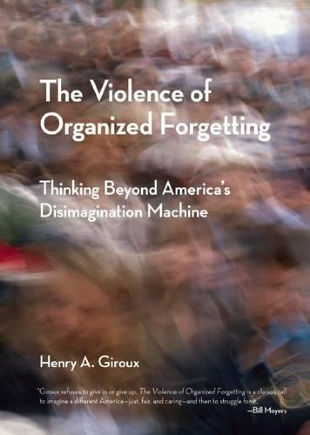"The stories we tell about ourselves no longer speak to the ideals of justice, equality, liberty, and democracy. The landscape of American politics no longer features towering figures such as Martin Luther King Jr., whose stories interwove moral outrage with courage and vision and inspired us to imagine a society that was never just enough. A culture that once opened our imagination now disables it, overwhelming the populace with nonstop marketing that reduces our sense of agency to the imperatives of ownership, shopping, credit, and debt. But these are not the only narratives that diminish our capacity to imagine a better world. We are also inundated with stories of cruelty and fear that undermine communal bonds and tarnish any viable visions of the future. Different stories, ones that provided a sense of history, social responsibility, and respect for the public good, were once circulated by our parents, religious institutions, schools, and community leaders. Today, the stories that define who we are as individuals and as a nation are manufactured by corporate media that broadcast the lifestyles of celebrities, billionaires, and ethically frozen politicians who preach the mutually related virtues of an unbridled free market and a permanent war economy. The power to reimagine, doubt, and think critically no longer seem possible in a society in which self-interest has become the 'only motive force in human life and competition' and 'the most efficient and socially beneficial way for that force to express itself.'
"These stories reciting the neoliberal gospel are all the more powerful because they seem to defy the public's desire for rigorous accountability, critical interrogation, and openness as they generate employment and revenue for right-wing think tanks and policy makers who rush to satisfy the content dictates of corporate media advertisers. Concealing the conditions of their own making, these stories enshrine both greed and indifference, encouraging massive disparities in wealth, health, nutrition, education, housing, and debt. In addition, they sanctify the workings of the market, forging a new political theology that inscribes a sense of our collective destiny to be governed ultimately and exclusively by market forces. Such ideas surely signal a tribute to Ayn Rand's dystopian society, if not also a rebirth of Margaret Thatcher's nonfiction invocation of the mantra of the wealthy: there is nothing beyond individual gain and the values of the corporate order.
"The stories that now dominate the American landscape embody what stand for common sense among market and religious fundamentalists in both mainstream political parties: shock-and-awe austerity measures; tax cuts that serve the rich and powerful and destroy government programs that help the disadvantaged, elderly, and sick; attacks on women's reproductive rights; attempts to suppress voter-ID laws and rig electoral college votes; full-fledged assaults on the environment; the militarization of everyday life; the destruction of public education, if not critical thought itself; and an ongoing attack on unions, social provisions, and the expansion of Medicaid and meaningful health care reform. These stories are endless, repeated by the neoliberal and neoconservative walking dead who roam the planet sucking the blood and life out of everyone they touch — from the millions killed in foreign wars to the millions at home forced into underemployment, foreclosure, poverty, or prison."
